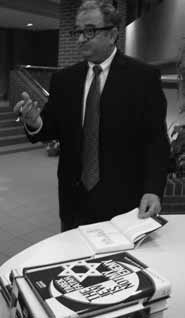Religious extremism in Islam, Tarek Fatah says, is a “disease that is affecting us to the point that we’re becoming insane with our hatred. I wanted to investigate what is the root cause of the hatred of the Jews.”
Born in Karachi, Pakistan, Fatah is the founder of the Muslim Canadian Congress and the author of the just-released “The Jew is Not My Enemy: Unveiling the Myths that Fuel Muslim Anti-Semitism.” His book tour included two stops in Montreal last week, including one at Côte St. Luc’s Beth Israel Beth Aaron Synagogue.
An outspoken critic of radicals in Islam, Fatah is no stranger to controversy. He has been criticized by many Muslim leaders for his opposition to the planned Mosque and community centre to be built near “Ground Zero” in New York City; he also went after Islamists – those who support the incorporation of Islam into the political system – with his first book, “Chasing a Mirage: The Tragic Illusion of an Islamic State.”
 “The force of his message is first and foremost important to Muslims because many of the moderate voices have been silenced,” said Rabbi Reuben Poupko, who invited Fatah to speak last Wednesday. He hopes more prominent figures in the Muslim community will speak out against hate speech. “I’m sure this is just the beginning and not just an isolated case.”
“The force of his message is first and foremost important to Muslims because many of the moderate voices have been silenced,” said Rabbi Reuben Poupko, who invited Fatah to speak last Wednesday. He hopes more prominent figures in the Muslim community will speak out against hate speech. “I’m sure this is just the beginning and not just an isolated case.”
Writing this latest book “has been a long journey for me,” Fatah told the Congregation. He spoke of the ties between Jews and Muslims during World War II; Mosques in Paris would shelter Jewish children from Nazis, he said, and hundreds of thousands of Muslims fought in the war as well. He described a pamphlet that was distributed within the Muslim community during the Holocaust encouraging families to help Jews whenever possible.
“They are our brothers,” it read, “with children like our own.”
But in just a period of decades, Fatah said, examples of Muslim-Jewish collaboration have all but vanished. He contrasted the generosity of Parisian Muslims in the 1940s with some of the messages being sent to Muslims worldwide today on television. On one Egyptian program, Fatah explained to the audience of some 300, a seven-year-old boy wishes that Allah would “destroy and torment the Jews with a disease with no cure…to turn their women into widows, their children into orphans.”
“Brothers and sisters,” Fatah said, “we are at a stage in our history where our entire community has a cancer growing on it. That cancer is hatred.”
He also reminded the Jewish community that “attacking Islamo-fascism should never be confused with attacking Islam,” and that there are plenty of secular Muslims who, like him, are tired of being lumped in with the extremists.
In Canada, “there are Muslims who look like you – they eat ice cream and sometimes even bacon!” Highly active on social networking websites like Facebook and Twitter, Fatah observed that of his thousands of followers, “the majority are young Muslim men and women who are fed up.”
On top of appealing for more rapprochement between the two communities, he was also critical of the Orthodox Jewish community for opposing Quebec’s Bill 94, which would ban the wearing of burqas or niqabs – radical Islamic dress for women that covers the face – in the public sector.
“Who has come out to support it (the anti-Bill 94 movement)? The Jewish community. We need people like you to take guilt out of our system. You don’t have to apologize for Western civilization. The burqa is a symbol of slavery.”
Again not shying away from controversy, while showcasing his sense of humour, Fatah quoted his wife, Nargis Tapal, who is disappointed when she sees fundamentalist Muslim men walking on Canadian streets with their wives and children, “five yards back. If she walks two yards back, as my wife says, she’s a feminist!”
“The Jew is Not My Enemy: Unveiling the Myths that Fuel Muslim Anti-Semitism” is currently in bookstores. Fatah is the co-host of Friendly Fire, weeknights from 7-10pm on
CJAD 800.

























Commentaires
Veuillez vous connecter pour poster des commentaires.